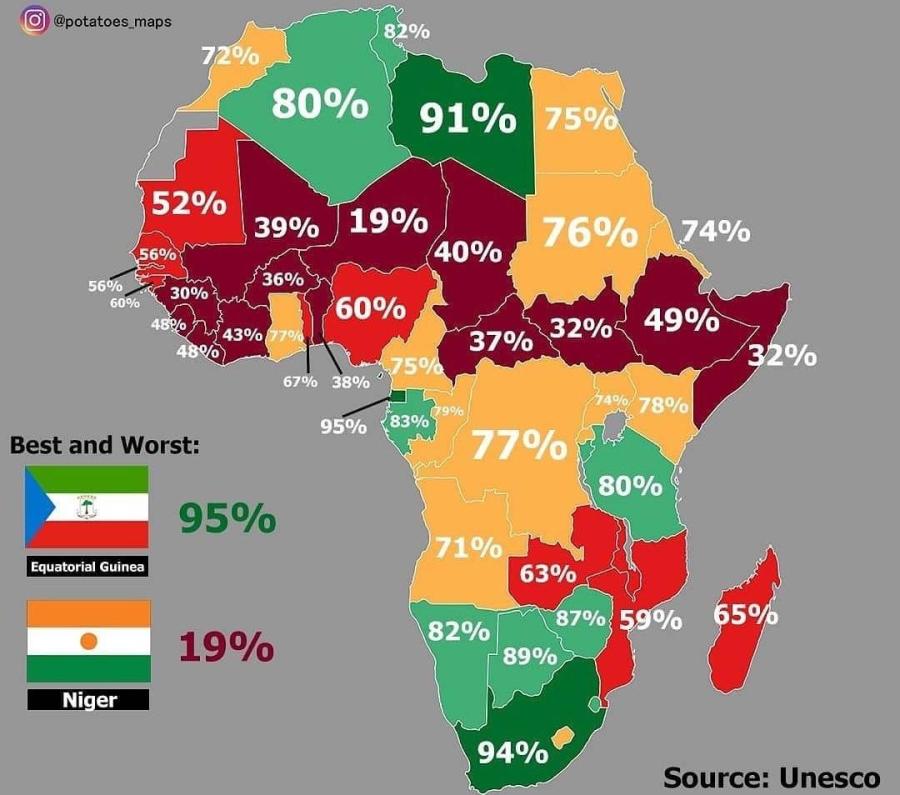I’ve just come across the following map which claims to show African literacy rates by country:

Now, before we go any further there are a number of issues with the map. For starters, I cannot confirm its accuracy and really I don’t love the “Best and Worst” categories. I made a quick attempt but did not come up with the immediate source of the map or its data. However, if you want something more, you can check up on some of the numbers in this article (Biale Zua, “Literacy: Gateway to a World of Exploits,” from The International Journal of Education and Literacy Studies, Vol. 9: 2021) or get a fuller picture from this UNESCO report (Peter Easton, Sustaining Literacy in Africa: Developing a Literate Environment, 2014). The map also leaves all sorts of questions on the table: how is literacy measured? What year (or years) is this data from? Does it include all age brackets? How was the data gathered? Are the numbers actually from UNESCO?
But with all of that said, the picture seems to be in the ballpark.
This map jumped out at me because it offers a sharp reminder: church life in Africa must be approached on its own terms.
In the West, we are remarkably dependent on literacy for our life as a church. Think about how much is mediated by text. We read the Bible, we recommend books, we pass out literature, we build websites full of written text. Think about how heavily we lean on literacy…as you read this. By way of comparison, the literacy rates for Canada and the UK both hover somewhere around 99%.
What this map tells us is that much of African Christianity is functioning within different parameters than that of the West. (Of course, there are a number of ways that this is true, but for now we’re just thinking about the one issue of literacy.) Christiane saw this early in her time in South Sudan and it is a crucial insight.
Church life, equipping leaders, and theological education in most of Africa needs to be approached on terms distinct from those of the West. Failing to recognize this is like flying camels or cars to Antarctica expecting to make a trek to the South Pole. It just doesn’t work that way there. There is a lot that can be said about Christianity and literacy but here I want to highlight the fact that the literacy rates in African demand a whole set of questions that are not faced in the Western context.
We also have to acknowledge that the answer is not to see literacy rates come up so that the church in Africa can read just like we do…or especially so that they can just read what we do. For a start, education is a long-term process. The state of things in a place like South Sudan makes it continually difficult to establish schools, especially in more rural settings. We cannot simply overlook the generations of South Sudanese Christians who will live between now and the extension of literacy throughout the countryside. These folks are just as called to the people and mission of God as any of the rest of us. Further, literacy is a technology. Like any other technology, it has its own baggage that must be accounted for. Cultures that are more dependent on aural resources have their own distinct advantages and these should not be bulldozed by the book.
So where does all this leave us?
First, to engage with the African church means to rethink the mechanisms of church life. Those of us who are on this track need to take the necessary time to listen and learn what it means to be the church, or to do theological education, with far less reliance on literacy.
One of the things that Christiane did in Mabaan county was to establish a centre called Deep Roots. Partly it is a library and bookstore (because while part of the challenge is being able to read, another is having the right things to read once you can) but Deep Roots also offered workshops that worked for people where they were at. It was a paradigm shifting moment for me when she had me think about how I would offer a workshop without writing anything down on a board or distributing a single shred of written material.
Second, this reminds us that literacy is optional, not essential to the gospel. After all, faith is not bound to reading the word, but to hearing the word (Romans 10:17). Jesus could read (Luke 4:17) but as far as we know he never owned anything like a book and the only thing we ever see him write down was scuffed away before a record of it could be made (John 8:6).
So let this be a call for us in the West to reconsider our dependency on the written word and learn to do things in other ways. At the very least, it is important for us to recognize that our particular apparatus of church life is not essential. Numbers are difficult to pin down, but the literacy rates amongst the early Christians were surely closer to those on the map above than they were to our 99%. What is more, the church is still growing impressively where literacy rates are lower. These facts defy our misguided attempts to export what we do and all the ways that we do it!
Although Jesus didn’t leave us anything written down, Paul certainly did. It is a good thing that we have the written Scriptures. But we also need to remember as we read, that when we are called to let the word of Christ dwell among us richly, the mechanism that Paul lays out for that to happen includes a lot of talking (and singing!) to one another but has nothing directly about reading and writing:

Here at the beginning of 2022, we are in need of bolstering our financial support base. If the things we’ve talked about here move you, would you consider joining in this work by supporting us financially? Click through the links below for more information or drop us a line (tyler.horton@sim.org / christiane.fox@sim.org).

We work on behalf of a team that sends and supports us as we serve the Global Church. Click on the Together… tab for more information about how you can partner with us so that the good news of Jesus will be heard where he is least known.

Super interesting- and eye opening- thanks Tyler:)
LikeLike
Thanks Dee!
LikeLike